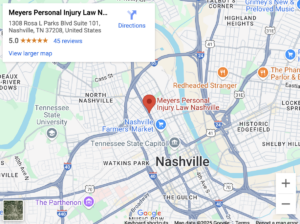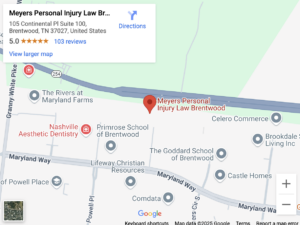[email protected] | January 24, 2024 | Personal Injury

A deposition is a significant part of the discovery process in legal proceedings, where witnesses provide sworn out-of-court testimony. It enables both parties to know what a witness will say in trial. While depositions are generally not as formal as courtroom proceedings, they carry a serious legal obligation for witnesses to provide truthful testimony. Participants may wonder about their rights during this process, particularly if they can leave the room or terminate the deposition prematurely.
Walking out of a deposition without proper justification could potentially have legal ramifications. Witnesses are required to stay and answer all the relevant questions presented by the attorneys, as long as those questions do not violate specific procedural rules or rights. If you are involved in a legal case, a personal injury lawyer in Nashville, TN can help guide you through the deposition process and ensure your rights are protected. Attorneys may instruct a deponent not to answer a question if it is deemed inappropriate or intrusive beyond the scope of the case.
There are certain circumstances where a deposition might be paused or concluded, such as health emergencies or procedural disputes. However, these interruptions are not equivalent to a participant unilaterally deciding to leave. Only under specific and generally agreed upon circumstances can a deposition be suspended or terminated. Understanding the boundaries of what is permissible during a deposition is crucial for all involved parties to avoid contempt of court or other legal penalties.
Legal Framework of Depositions
Depositions are governed by specific legal rules and procedures, designed to ensure that the discovery process is fair and orderly. This framework covers how depositions are conducted, their purpose in legal proceedings, and the conditions under which a participant may exit a deposition.
Understanding Depositions
A deposition is a sworn, out-of-court testimony given by a witness in the course of pre-trial discovery. They are typically recorded verbatim by a court reporter. Depositions allow attorneys to gather information and evaluate the credibility of witnesses. Key regulations covering depositions are set forth in the Federal Rules of Civil Procedure (FRCP) for federal cases or corresponding state rules for state cases.
Role of Depositions in Legal Proceedings
Depositions serve several functions in legal proceedings:
- Discovery: They provide a mechanism for parties to obtain testimony and other information from witnesses.
- Evidence preservation: Depositions can preserve a witness’s recollection while it is still fresh.
- Impeachment: Later, during trial, if the deposed witness’s in-court testimony differs from their deposition, the deposition transcript can be used to challenge their credibility.
Legal Grounds for Leaving a Deposition
Participants in a deposition, whether they are witnesses or attorneys, generally cannot leave the deposition at will; they must have valid legal grounds. Such grounds include:
- Health emergency: If a deponent or attorney faces a sudden health issue.
- Violation of rules: If there’s clear evidence of bad faith or misconduct by an attorney during the deposition.
- Completion: Once all the relevant questions have been asked and answered.
It is essential that any departure from a deposition is supported by documented reasons to avoid sanctions or being compelled to return.
Consequences of Walking Out
Walking out of a deposition can have significant legal repercussions, varying from court sanctions to negative impacts on the case itself.
Contempt of Court
When an individual walks out of a deposition without permission, they risk being held in Contempt of Court. This is a serious offense, as it signifies a disregard for court procedures and rules. A judge can issue a contempt order that may lead to consequences such as fines or even jail time.
Adverse Inferences
If a deponent leaves a deposition abruptly, the court may allow the opposing party to request Adverse Inferences. This means that the court can assume that the deponent’s testimony, if fully given, would have been unfavorable to their case.
Financial Penalties
Financial penalties can be imposed on a deponent who walks out. These can include:
- Paying the legal fees of the opposing party
- Covering the costs for additional court sessions
- Reimbursement for the time wasted due to their abrupt departure
Case Dismissal Risks
Lastly, walking out of a deposition can increase Case Dismissal Risks. A plaintiff who walks out may see their case dismissed for lack of cooperation. Similarly, a defendant’s actions might be viewed as non-compliance, adversely impacting their defense.
Allowable Reasons for Departure
Participants in a deposition have the right to leave the proceedings under specific circumstances that are deemed permissible by legal standards.
Health Emergencies
If a deponent or any other essential participant experiences a sudden health crisis, this constitutes a valid reason to adjourn a deposition. Health emergencies that pose immediate threats, such as acute medical conditions or severe distress, require prompt attention and take precedence over continuing with testimony.
Breach of Deposition Protocol
A deposition must adhere to established legal protocols. If these procedures are violated, such as through inappropriate behavior by an attorney or witness tampering, it may be necessary to pause or terminate the session. The reasons for such breaches include but are not limited to:
- Harassment or intimidation of the deponent
- Disclosure of confidential information against court rules
- Coaching of a witness during their testimony
- Refusal to adhere to time limits set by the court
Ethical and Professional Considerations
Ethical dilemmas can also justify departure from a deposition. An attorney may advise a client to leave if continuing with the deposition would lead to a violation of ethical standards or professional conduct. Examples include:
- A conflict of interest becoming apparent,
- Evidence of legal misconduct,
- Potential for perjury if testimony continues under duress.
Negotiating Deposition Terms in Tennessee
In a deposition, parties can negotiate terms to streamline the process and ensure fairness. This includes setting schedules, conduct rules, and outlining each counsel’s role.
Scheduling and Timing Agreements
Scheduling and timing are critical in the deposition process. Parties often agree on specific dates and timeframes to avoid conflicts and ensure availability of all participants. It’s important to:
- Finalize Dates: Agree on deposition dates well in advance.
- Duration: Set reasonable durations for each deposition to prevent fatigue and excessive time commitments.
Stipulations on Deposition Conduct
Deposition conduct covers rules that participants must adhere to. Common stipulations include:
- Speaking Turns: Only one person speaks at a time to maintain clarity in the deposition transcript.
- Document Handling: Procedures for presenting and handling documents during testimony need clear definition.
Counsel’s Role in Negotiations
Counsel for each party plays a vital role in negotiating deposition terms. Their responsibilities include:
- Advocating: Ensuring their client’s interests are well-represented in negotiations.
- Mediating: Helping resolve disputes over terms to prevent delays in the deposition process.
Alternatives to Leaving a Deposition in Tennessee
Walking out of a deposition is generally not advisable, but there are proper procedures to manage challenging situations without resorting to abandonment.
Taking Breaks
Depositions are not continuous interrogations, and witnesses have the right to take short breaks. These breaks can be for rest, refreshment, or to consult with their attorney. Participants should state on the record that they need a recess, which helps to maintain the deposition’s formality and prevent any misconceptions about the participant’s actions.
Requesting Clarifications
When faced with unclear, complex, or ambiguous questions, a deponent can request clarification from the examining attorney. It is acceptable to ask for the following:
- Simplification of convoluted questions
- Definitions of any terms that are not understood
- Rephrasing for better comprehension
This ensures accurate responses and minimizes misunderstanding.
Filing Motions with the Court
If a situation arises that cannot be resolved during the deposition, parties involved have the option to file a motion to seek the court’s intervention. Instances where this might occur include:
- Objections to improper questioning
- Protective orders to limit certain lines of inquiry
- Sanctions against parties for misconduct
Preparing for a Deposition
Effective preparation is crucial for a deposition to ensure a witness understands their rights, complies with the legal process, and collaborates effectively with their attorney.
Understanding Your Rights
A deponent has specific rights that offer protection during the deposition process. They are entitled to know the scope of the deposition and can consult with their lawyer before answering any questions. Objections may be raised by their counsel if a question is inappropriate.
Reviewing the Notice of Deposition
The Notice of Deposition is a key document that must be carefully reviewed. It includes essential details such as:
- The deposition date, time, and location
- The scope of the inquiry
- Instructions on what documents to bring
Comprehension of these elements is essential for preparation and compliance.
Developing a Strategy with Legal Counsel
Working closely with legal counsel is vital for devising a testimony strategy. This collaboration may involve:
- Discussing possible questions and formulating clear responses
- Considering the legal implications of the testimony
- Practicing with mock depositions to gain confidence and poise
Frequently Asked Questions
This section explores common inquiries about the deposition process, providing clear and concise answers to enhance understanding.
Are you obligated to provide testimony during a deposition?
Individuals who are subpoenaed are legally required to provide testimony during a deposition. Failing to comply with a subpoena could result in legal penalties.
Are there strategies attorneys may employ during depositions?
Attorneys often employ strategies such as asking open-ended questions and requesting clarifications to extract comprehensive and accurate information from witnesses.
Is there compensation for individuals providing testimony in a deposition?
Witnesses are typically entitled to compensation for their time and any expenses incurred while attending a deposition, as per state laws and court rules.
What occurs if a deposition is canceled shortly before it is scheduled?
If a deposition is canceled shortly before it is scheduled, parties should receive notice of the cancellation. The deposition can be rescheduled based on mutual agreement and court schedules.
How should you respond to questions during a deposition to ensure accuracy and completeness?
Witnesses should listen to questions carefully, answer truthfully, and stay within the scope of the question without providing unsolicited information to ensure responses are accurate and complete.
What are the legal consequences of not attending a scheduled deposition?
Not attending a scheduled deposition can result in contempt of court charges, fines, and potentially other court-imposed sanctions against the absent party.
Contact Our Nashville Personal Injury Law Firm Today at Meyers Personal Injury Law
If you were injured in an accident in Nashville or Brentwood and need legal help, contact our Nashville personal injury lawyers at Meyers Personal Injury Law to schedule a free case review today.
Meyers Personal Injury Law Nashville
1308 Rosa L Parks Blvd Suite 101,
Nashville, TN 37208
(615) 258-9000

Meyers Personal Injury Law Brentwood
105 Continental Pl Suite 100,
Brentwood, TN 37027
(615) 258-9000
About the Author Chad Meyers

Chadwick D.G. Meyers is the founding attorney of Meyers Personal Injury Law. He earned his J.D. from the Nashville School of Law and focuses his practice on serious personal injury cases involving car accidents, wrongful death, funeral home negligence, and more.
Chad is frequently consulted by attorneys nationwide on complex claims and has been recognized by The National Trial Lawyers and other legal organizations. Click here to view some of the successful case results Chad has achieved for his clients.



